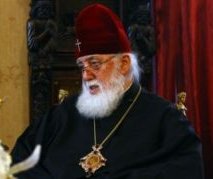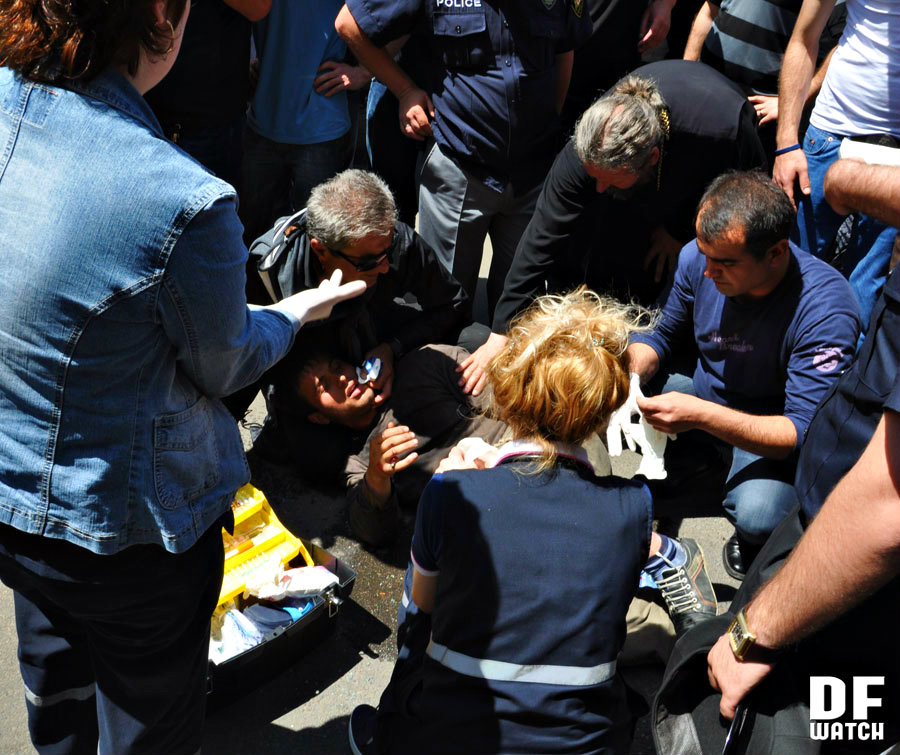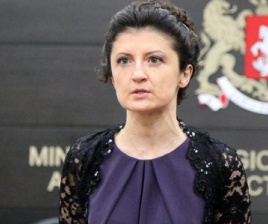
TBILISI, DFWatch–The Georgian Orthodox Church is opposed to a draft anti-discrimination bill, which is currently making its way through parliament. Clerics there want to remove ‘sexual orientation’ from the text.
But human rights activists and Tbilisi-based NGOs insist that the bill must be made to include all minority groups.
In a joint statement of about 40 non-governmental organizations published on Monday and addressed to parliament, they write that the draft for an anti-discrimination bill must be amended in order to make it efficient and give citizens an opportunity to enjoy their rights on an equal basis, regardless of race, skin color, language, sex, age, national origin, birth place, place of residence, property, social status, religion or belief, national, ethnic or social origin, profession, marital status, health, disability, sexual orientation, gender identity and expression, political or other opinion or other status.
The first draft was prepared by the Ministry of Justice after consulting with international and local human rights organizations. The draft was sent to parliament at the end of March. It was based on recommendations by the OSCE and UN.
When Justice Minister Thea Tsulukiani first presented the draft, she said that by adopting this law Georgia will live up to important an precondition for implementing the action plan for visa liberalization, an agreement made with the EU.
After parliament passed the draft at the first hearing, it was later changed several times, and both NGOs and religious organizations are unhappy with the current draft.
Read more about the amendments in an opinion piece by Sarah Delys on DFWatch: https://dfwatch.net/georgias-watered-down-anti-discrimination-law-89409
The statement by about 40 NGOs based in Georgia says there are important aspects which need to be taken into account before parliament passes the bill:

“Despite the fact that there are different European models of institutions established for the protection of equality, international human rights standards require the existence of effective internal legal remedies. This will provide real opportunities for the victims of discrimination to recover their violated rights. Legal remedies should include both repressive and preventive measures, as well as restitution (civil) mechanisms. In the current legislation, the major repressive mechanism against the discrimination is the Criminal Code. As the discriminatory actions infringing on human rights do not often reach the sufficient intensity of violence or deprivation of rights, all possible forms of discrimination do not constitute a criminal act. As a result, the majority of discrimination cases remain without any legal responses. Due to the lack of appropriate legal mechanisms, consideration of the possibility of an adequate response on discrimination cases through low sanctions is required for their elimination;”
“Compensation mechanisms for damages cannot be considered as an alternative to the fining mechanism under the Civil law, as these two mechanisms are different in their nature and purposes. The compensation enables the individual to restore the right that has been violated, while the fining mechanisms have more preventive purposes against the offender and other persons. Based on the existing legal regulations and the court practice, the possibility of receiving compensation may not be an alternative to the fining mechanism, as the compensation for moral damages under the civil law is clearly inefficient legal protection;”
“Imposing the fines on the individuals that have committed the discriminatory act through the court and on the basis of the protocol prescribed by the Ombudsman, will not pose a threat to the legitimacy of the Ombudsman and will not contravene its constitutional nature, as: 1. The Ombudsman will use the fining mechanism only as an extreme measure for responding on violation, when the reasonable time of implementing mediation and recommendation is exhausted. In this process, individuals committing the discriminatory act will have an opportunity to properly consider the implications of non-discrimination law and to implement individual and general measures in order to eliminate them. The Public Defender has a supporting role in this process; 2. Current administrative violations code defines opportunity to appeal to court in case if ombudsman’s legal demands aren’t fulfilled. 3. Individuals that have presumably committed the discriminatory act will have the opportunity to protect their rights and interests in the court, under the conditions of a fair trial;”

“Enactment of the law and effective planning of information policy regarding its requirements and scale, as well as the fining mechanism used by the Ombudsman as an extreme measure, will solve the problem of the lack of knowledge of public officials or individuals about the non-discrimination requirements and standards.”
Also on Monday, Georgian Patriarch Illia II, the probably most influential person in the country, published a statement asking parliament to postpone the passing of the anti-discrimination bill.

He wrote that the Georgian Church sees violence and discrimination as unacceptable, as it is against Christian religion.
“Having the terms ‘sexual orientation’ and ‘gender identity’ in a draft bill of such importance for the development of the country causes concern among people, because the personal rights of our citizens are equally protected nowadays by the current Georgian legislation.”
He also writes that believers ‘fairly’ consider non-traditional sexual relations as deadly sin.
“For them, the draft for an anti-discrimination law in this form is propaganda and legalization of this sin,” he continues.
The Patriarch wants parliament to postpone the passing of the bill and let the church and the ‘wider society’ engage in discussions about the draft in order to reach agreement.
Justice Minister Thea Tsulukiani said during a talk show on Maestro on Monday that concerns about the draft law are groundless. She referred to the Patriarch’s statement and said she had consultations with clerics during the preparation of the draft and will do it again if necessary.
She said it is important to specify in the law all forms of discrimination and that this is a precondition for signing the Association Agreement with the EU.
“This is much better for our country and four our territorial integrity, national unity, rather than groundless concern about the possibility that there will be some unrest because of this specification in the law,” she said.
“The only thing which is important, and I see that neither the constitution, nor the draft prepared by the Ministry of Justice or the amended draft by the government sent to parliament can and will ever be grounds for single-sex marriage in Georgia and for the right to adopt a child by single-sex couples.”
Despite the Patriarch’s appeal, parliament did not change its decision to review the bill, and today the human rights committee is holding a discussing attended by NGO representatives. Tomorrow, parliament will vote on whether to pass it at the second hearing.

